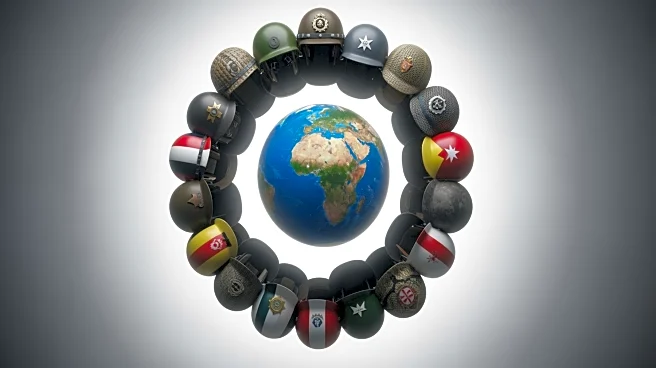What's Happening?
A U.S. adviser has announced that planning is underway for an international stabilizing force to enter Gaza. The initiative reportedly involves participation from Egypt, Qatar, the UAE, and Azerbaijan. This development comes amid ongoing tensions in the region,
with the aim of establishing peace and stability. President Trump addressed the situation during a press conference at the White House, highlighting the importance of international cooperation in resolving conflicts in the Gaza Strip. The involvement of these nations indicates a collaborative effort to address the challenges posed by regional instability and the activities of groups such as Hamas.
Why It's Important?
The formation of an international force in Gaza is significant as it represents a concerted effort by multiple countries to stabilize a region that has been fraught with conflict. The participation of Egypt, Qatar, the UAE, and Azerbaijan underscores the importance of regional cooperation in addressing security concerns. This initiative could potentially lead to a reduction in violence and pave the way for diplomatic solutions. For the U.S., this move aligns with broader foreign policy goals of promoting peace and stability in the Middle East. The success of this force could have implications for future international interventions in similar conflict zones.
What's Next?
The next steps involve detailed planning and coordination among the participating nations to ensure the effective deployment of the stabilizing force. Key stakeholders, including political leaders and military officials, will likely engage in discussions to outline the operational framework and objectives of the mission. The international community will be watching closely to see how this initiative unfolds and whether it can achieve its intended goals. Potential reactions from groups within Gaza, as well as neighboring countries, will be critical in determining the success of this effort.
Beyond the Headlines
The deployment of an international force in Gaza raises questions about the long-term impact on regional dynamics and the role of external actors in Middle Eastern conflicts. Ethical considerations regarding sovereignty and the influence of foreign powers in domestic affairs may arise. Additionally, the cultural and political implications of such a force could affect local perceptions and relationships between the involved nations.


















